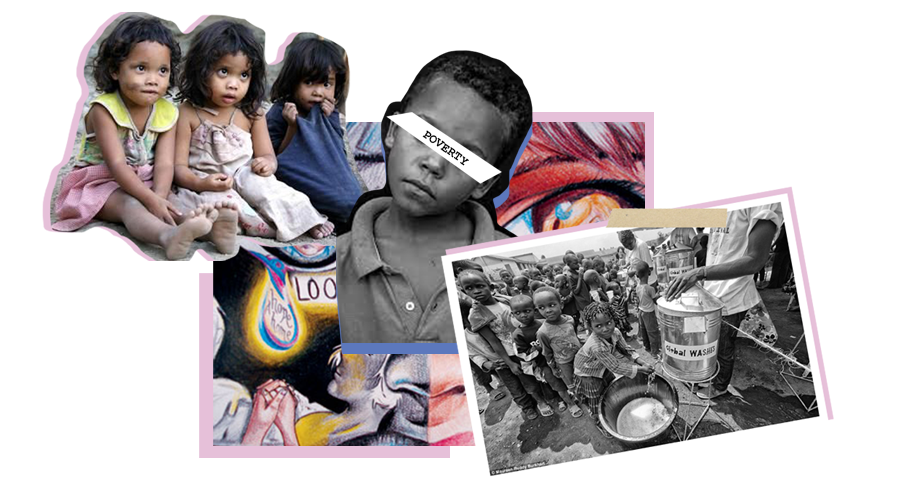
cut shayla azalea revikashah
2006484564
Sastra Inggris
Fakultas Ilmu Budaya
Universitas Indonesia
POVERTY, a brief explanation.
Global poverty is one of the worst problems that the world faces today. The poorest in the world are often hungry, have much less access to education, regularly have no light at night, and suffer from much poorer health. To make progress against poverty is therefore one of the most urgent global goals.
The current official poverty measure was developed in the mid 1960s by Mollie Orshansky, a staff economist at the Social Security Administration. Poverty thresholds were derived from the cost of a minimum food diet multiplied by three to account for other family expenses.
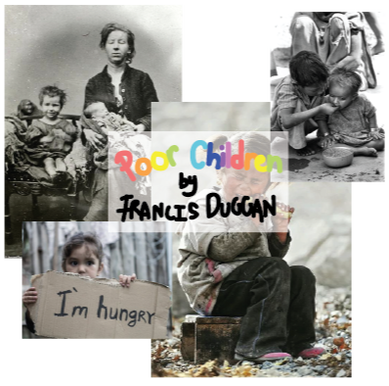
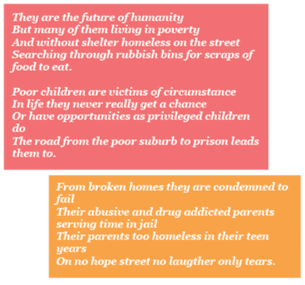
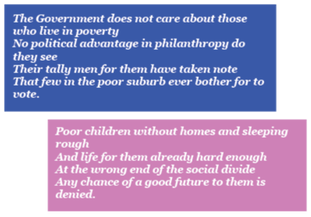

"Poor Children" speaks volumes about the hardships linked to child poverty. This contemporary poem takes 'inspiration' from the roughly one billion children that are currently living in poverty according to UNICEF. Approximately 22,000 children die daily due to poverty.
The idea that children are the future of this world and should be cared for and educated is highlighted in this poem. The speaker voices that poor children are very unfortunate as they have rights to a bright future but are unable to pursue it as they don't have the same opportunities and resources as kids with better social status. The main cause of their sadness is drawn to their families and backgrounds, whether it be broken homes or parents who are also homeless when they were little.
The government also hardly pays attention to those who live in poverty and in this world where the rich get richer and the poor get poorer, children from poor families barely receive support from society, though these days free education and the likes are evolving. Children live in poverty don't know any better and are less educated, therefore their lives often take a bad turn. Poor children are more common to violence and crime, turning into thieves to make ends meet.
This poem teaches us that children are our future and character development starts at an early age. Therefore, though we should eliminate all poverty, it's the children we should mainly focus on. By acting early, we could potentially save them from a murky future and help them get better education to qualify for better jobs that can ultimately lead to an end in poverty.


by Eugenia Collier
story analysis.
A. SYNOPSIS
Born from a poor family, Buddy was the youngest of his siblings. They lived in poverty; their parents were sharecroppers. The oldest brother, Charley, was important in Buddy’s life as he was a father figure. With their poor condition to blame, education was almost ignored in Buddy’s family, but his parents and Charley encouraged him as the youngest child to continue his studies. Charley often encouraged Buddy to break the chain of poverty through education and become a prominent figure in society.
Buddy finished his studies with flying colors and became a professor. When their parents passed away, every child scattered and grew a family of their own. One day, Buddy had a business meeting in New York, the city where Charley his wife settled. He stayed in Fifth Avenue Hotel. Charley and his wife, Bea, was happy to welcome Buddy when he visited their home. Charley told that several months back he had picked up a kid from the school Buddy worked at, and Charley asked that kid whether he knew Buddy or not. The student expressed that Buddy was the best teacher he had, but Charley did not tell him that he's Buddy’s brother. He didn’t want to embarrass Buddy by letting one of his students know that his brother is a lowly cab driver.
By the time Buddy prepared to leave Charley's house, Bea wrapped a sweet potato pie in brown paper bag and gave it to Buddy, which Buddy was very happy and thankful about. Charley drove Buddy in his cab and they stopped a bit down the street from Buddy’s hotel. Buddy invited Charley in, but he refused. When Charley knew that Buddy carried a sweet potato pie, he asked Buddy to hand it over. Charley said, “People in that hotel don’t go through the lobby carrying a brown paper bag.”
Buddy didn't feel the same, but after a debate with his brother and Charley insisting, he handed over his bag of sweet potato pie and let him go. Buddy entered the hotel still thinking about his lost snack and felt very compassionate when he realized that Charley was walking behind him carrying the brown paper bag with the sweet potato pie behind him.
B. SETTING
Places:> The 14th floor of Fifth Avenue Hotel, Harlem, New York
> Charley’s apartment in Lenox Avenue
> Buddy's childhood home
· Time :
> Late afternoon to evening
· Social setting:
> A poor family of sharecroppers, a hard life full of struggles.
C. CHARACTERS
· Main characters :
> Buddy: The youngest child of a poor family who succeeded in becoming a Professor
> Charley: Buddy’s brother
· Minor characters :
> Father and Mother: Buddy's parents who are farmers
> Lil: Buddy’s sister,
> Alberta: Buddy’s sister
> Jamie: Buddy’s brother
> Bea: Charley’s wife
> Mary: Charley’s daughter
> Lucy: Charley’s daughter
> Jake: Lil’s husband
D. PLOT
· Exposition: From paragraph 1 to 2
· Complication: From paragraph 3
> Especially when Buddy begins to remembers his childhood with Charley, to paragraph 30. In this part, the writer presented a flashback story.
· Crisis : Paragraph 31
> When Charley didn’t let Buddy enter the hotel carrying sweet potato pie wrapped in a brown paper bag.
· Falling action : Paragraph 32
> When Buddy thought about his lost snack and what Charley had done.
· Resolution : Paragraph 33
> When Buddy realized that Charley was carrying a brown paper bag for him.
E. POINT OF VIEW : This story carries a first person point of view and it is also limited omniscient.
F. SYMBOLISM : The sweet potato pie is a symbol in this story—a symbol of love between Buddy and his brother, and a symbol of his former life.
G. TONE : This story is filled with compassion and sympathy
H. THEME : This story has a theme of poverty, sacrifice, and family love. The theme of this story is the main reason why I chose it, because it has a very important message on poverty and this story actually shows someone finding a resolution to their life in poverty. If anything, this is a story of success.
I. MORAL
> When it comes to family, people should carry feelings of insight, wisdom, and compassion. Family comes first.
· People should be aware that education is important and is the key to break poverty.
J. OVERALL
This story is very interesting and teaches us many life lessons. It teaches us to have appreciate our family and cherish them while they're still here. Even the smallest actions are backed up with the best intentions and love. Moreover, this story depicts a crucial point, which is the actions of love speak louder than words. Charley took the pie and didn't mind being a lowly "nobody" for his brother Buddy who he viewed as a more successful figure who shouldn't be seen doing things someone socially lower than him would. While Buddy did not agree with Charley's views, the latter's actions was touching and caring.
The writing style of this story makes the story easy to understand despite the heavy symbolism, but the author's vocabulary is pretty heavy and complicated for your average reader. Despite that, "Sweet Potato Pie" by Eugenia Collier is a heart-warming and educational story.

topic: poverty
Today I sat down with one of my friends, Kelvin, to do an interview on poverty and his thoughts regarding the topic. I asked him several questions and his replies were pretty insightful. The interview can be seen on the video above.
The reason why I chose Kelvin as my interview subject is because he is significantly older than I am, 24, and is already a working adult. Therefore, he should have more knowledge on this issue and how hard it is to make money in the real world. His restaurant business is also located in an area where often times poor people would come to and beg.
He explains that witnessing that while customers are enjoying their time makes him realize the immense economy and social class difference and how it is very much unresolved problem, especially in Indonesia.

Below is my reading video. I really enjoyed making this because this is something that is outside of my comfort zone and I wouldn't be doing this if it was not assigned, so it was fun for me to discover something new!
final project

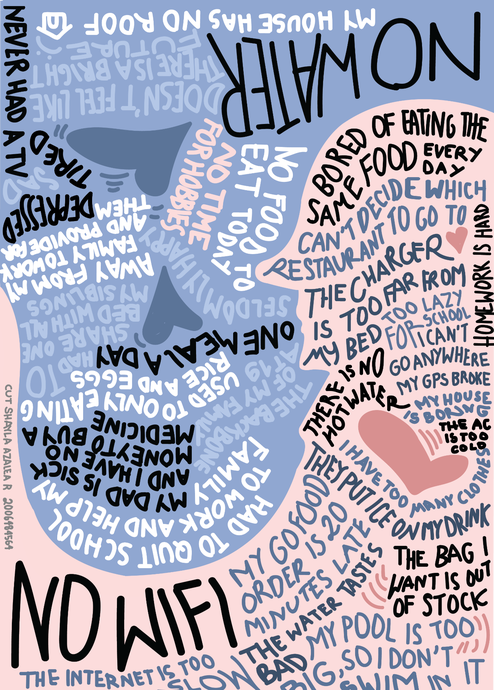
aAbove is the 'artwork' or poster I made for my creative final project, titled "How Privileged Are We?". The background behind this project is when I was complaining to myself one day about how the water from my water dispenser tasted bad because the filter wasn't working. Then it got me thinking about how much of a petty problem that was and how some people might not have any access to water.
Since then, whenever I complain to myself about something so irrelevant and ungrateful like how my phone charger doesn't reach my bed, I wrote it down and made a list. I also asked some of my friends about what first world problems they usually have and complain about. I realized that all these things we complain about and think are irksome problems actually show how privileged we are and how we should be more grateful with what we have.
One of my house assistants, my gardener, used to live in poverty back in his village before coming to Jakarta to work. He came to Jakarta to find labor to help his family back home, and he send back most of the salary he gets to his family. I asked him what struggles he might have had back then or still have, and the day-to-day problems he told me he experienced are such a contrast to the list of problems me and my friends made.
The message behind this project is for us to be more grateful with what we have because some people who are less able than we are might not even have access to what we have. We should start by appreciating the things we have and try to help those in need.
The poster was very insightful to make because as I was writing the problems and zoomed out of my Illustrator program to see the current progress, I realized how different the two are, especially with the contrasting colors used.
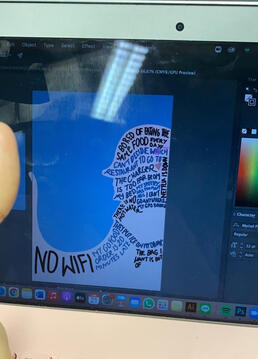
This is the poster in the making.